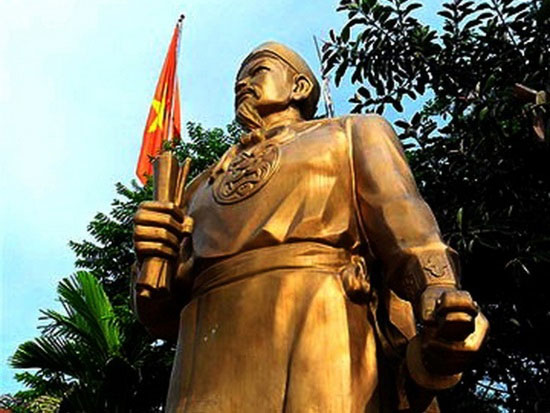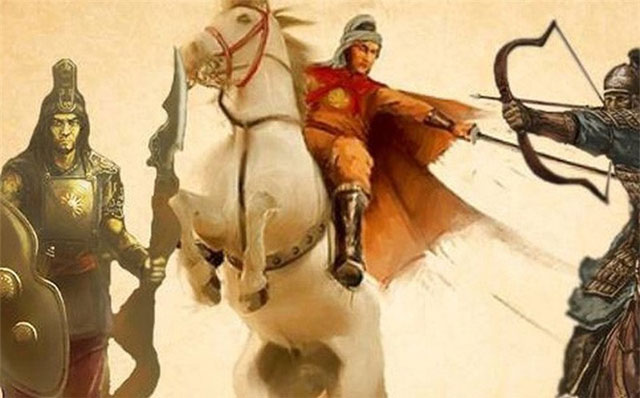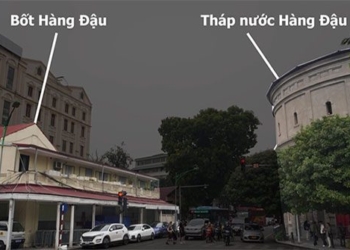Drinking wine through the nose, eating with hands, mastering foreign languages, and earning the admiration of envoys from various countries – these are some little-known anecdotes about the renowned general Trần Nhật Duật.
Prince Trần Nhật Duật (1255-1330) was the sixth son of King Trần Thái Tông.
According to The Complete History of Đại Việt, he was born on the 10th day of the fourth month of the Year of the Cat (1255). From birth, he had an unusual appearance, leading his father to name him Trần Nhật Duật and bestow upon him the title of Prince of Chiêu Văn.
Drinking wine through the nose to pacify rebels
In 1280, in the Đà Giang region of the Northwest mountains, Trịnh Giác Mật gathered rebels to rise against the royal court, while the Yuan dynasty was preparing a large army to invade Đại Việt, putting the country at risk from both internal and external threats.
To focus his efforts on dealing with the Yuan forces, King Trần Nhân Tông appointed Trần Nhật Duật as the An Phủ Sứ of Đà Giang to urgently resolve this serious situation. Under the banner of “Defending Đà Giang“, Trần Nhật Duật led his troops into the Northwest.
Knowing that the royal troops were approaching, Trịnh Giác Mật plotted to ambush them and sent a messenger to invite Trần Nhật Duật, saying: “Giác Mật does not dare to defy the royal decree. If the noble lord comes alone on horseback, Giác Mật will surrender immediately.”
Ignoring the objections of his generals, the 27-year-old general rode alone to meet Trịnh Giác Mật, accompanied only by a few young attendants carrying a chest. Upon arriving at Giác Mật’s camp, he calmly walked through a forest of swords and a group of soldiers in bizarre uniforms meant to intimidate.
While conversing, Trần Nhật Duật spoke to Giác Mật in the local dialect of Đà Giang: “My young attendants feel hot in their left ears on the way here, and now they feel hot in their right ears, which is due to the great hospitality of Leader Trịnh.”

Statue of Trần Nhật Duật.
Trịnh Giác Mật and the other leaders were astonished by Trần Nhật Duật’s command of their language and customs. When the wine was served, Trịnh Giác Mật gestured to invite him, almost as a challenge. Without hesitation, he took the meat, ate while tilting his head back, and expertly poured the wine through his nose as if he were a local. Trịnh Giác Mật exclaimed: “Prince Chiêu Văn is like a brother to me.”
Trần Nhật Duật responded, “We have always been brothers,” and then instructed his attendants to open the chest and present silver bracelets to each of the Đà Giang leaders. The heads of the Đà Giang faction joyfully accepted the tokens of brotherhood in accordance with their customs from Trần Nhật Duật, who they had just recognized as a brother. Thus, Đà Giang was pacified without shedding a drop of blood or losing a single arrow.
The most linguistically gifted general in Vietnamese history
From a young age, Trần Nhật Duật was renowned for his intelligence, eagerness to learn, broad knowledge, deep respect for Daoism, and mastery of many foreign languages and customs of neighboring countries.
Learning both Song and Champa languages, Nhật Duật not only became fluent in them but also understood many aspects of those cultures, including their customs and practices.
He frequently interacted with people from Champa and the Song dynasty. Therefore, by the age of 20, he was entrusted by the court with responsibilities concerning these ethnic groups.
The Complete History of Đại Việt records that once, when an envoy from the ancient state of Sách Mã Tích (the old name for Singapore) came to pay tribute, the court could not find a translator. Trần Nhật Duật learned of this and went to meet the envoy, conversing fluently in their unfamiliar language to the amazement of those present.
Afterward, when asked how he had learned the language of Sách Mã Tích, he replied: “During the reign of King Thái Tông, an envoy from that country came, and I had the opportunity to interact with them, thus I learned a bit of their language.”
At that time, it was customary for the court to send translators when envoys from the North arrived, and the prime minister was not allowed to speak directly to them to avoid any misunderstandings that could be blamed on the translator.
However, Prime Minister Trần Nhật Duật often spoke directly with the Yuan envoys, accompanying them to their lodgings, and sitting down to drink and converse as if they were old friends. His fluency in Chinese and understanding of Han culture led the Yuan envoys to believe that Trần Nhật Duật was a Han individual who had migrated to Đại Việt.
King Trần Nhân Tông once remarked to him: “You, Chiêu Văn, must be the reincarnation of a translator, which is why you are so skilled in the languages of those countries.”
Outstanding achievements against the Yuan forces
In addition to his remarkable linguistic abilities, Prince Trần Nhật Duật was also a great military leader, an outstanding diplomat, and a learned cultural figure in Vietnamese history.
He was the commander of the Trần army that defeated the forces of Toa Đô at the Hàm Tử Gate at the end of April 1285. The book The Complete History of Đại Việt recorded: “In the fight against the Yuan invaders, Nhật Duật achieved more than anyone else.”

Trần Nhật Duật during the resistance against the Yuan-Mongols.
Under the reign of King Trần Minh Tông, Trần Nhật Duật was appointed as Tá Thánh Thái Sư. During the reign of King Trần Hiến Tông, he was bestowed the title of Đại Vương Chiêu Văn.
Despite holding the position of prime minister during the Trần dynasty and serving under four kings with significant contributions in battles, Trần Nhật Duật always maintained his noble and dignified character. He approached every matter with careful consideration and thoroughness, never using his position to intimidate others.
Devotion to the nation
Trần Nhật Duật was known for his modesty and composure, rarely showing his emotions. Despite his remarkable talents, he was very honest and straightforward in matters of state. His wife, Lady Trịnh Túc, once sought his counsel privately at home, and he pretended to agree. However, when the matter was presented to him in court by his secretary, he refused it.
In his household, he did not keep a whip to punish servants, and if punishment was necessary, he always clearly stated the offenses beforehand. Once, a servant of his was accused by Quốc phụ Thượng Tể Trần Quốc Chẩn, who sent someone to arrest him.
The servant ran into the house, and the pursuer chased him inside, causing a commotion. His wife cried out, saying: “You are a prime minister, and Bình chương is also a prime minister; it is only because of your kind and gentle nature that people look down on you like this.”
He remained calm and said nothing, instructing the servant: “You should go out; the law is the same everywhere.”
In 1330, Prince Trần Nhật Duật passed away at the age of 75. His name and career are forever linked to the most glorious period of the Trần dynasty, highlighted by the three victories over the Mongol-Yuan invaders.
Trần Nhật Duật truly deserves to be recognized as a multifaceted cultural and military figure, a model diplomat in Vietnamese history.

















































